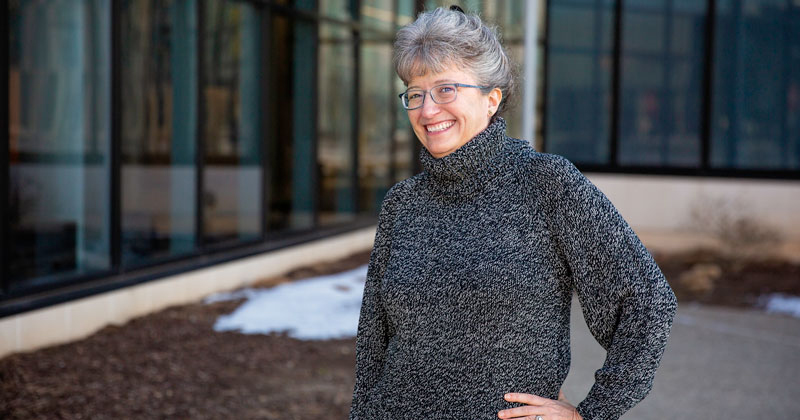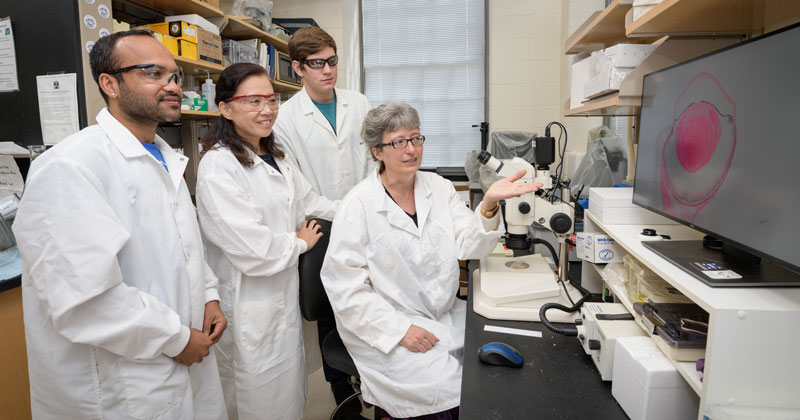


Biomedical research leader
Photos by Ashley Barnas and Evan Krape February 01, 2022
Duncan appointed research AVP, Delaware INBRE director
Melinda Duncan, professor of biological sciences at the University of Delaware, has been appointed associate vice president for research at UD and director of the Delaware IDeA Network of Biomedical Research Excellence (INBRE).
Funded by the National Institutes of Health and the state of Delaware, Delaware INBRE is a collaboration of academic, research and health care institutions working to boost the state’s biomedical research capacity. The network includes UD, Delaware State University, ChristianaCare, Delaware Technical Community College, Nemours Children’s Health and the Wilmington VA Medical Center.
“Dr. Duncan has a reputation for excellence across research, graduate education and diversity, equity and inclusion. I look forward to our work on strategic projects that support Delaware’s research growth and its positive impact on Delawareans,” said Charlie Riordan, vice president for research, scholarship and innovation. “I also thank Steven Stanhope, professor of kinesiology and applied physiology, for the tremendous contributions he made in these roles over the past eight years. Melinda brings great expertise and energy to continue the momentum.”
Duncan, who grew up in nearby Cecil County, Maryland, has been involved in research since she was an undergraduate student. But her early years in college were not easy, and she is committed to removing whatever hurdles she can for others.
“I was the first in my family to go to college, and I really didn’t know what was expected—I didn’t know how to play the game,” she said. “I really struggled at first.”
Fortunately, one of Duncan’s professors was impressed by her laboratory work and encouraged her to apply for an undergraduate research internship. The experience turned her around academically. She would end up contributing to new discoveries, co-authoring an impressive four research publications as an undergraduate. She went on to excel in her studies and then kept on going, pursuing her Ph.D. and becoming a professor.
Now, as director of the Delaware INBRE program, she will lead a major initiative to expand the state’s biomedical workforce and infrastructure, with the ultimate goal to improve the health of Delawareans. And she and her collaborators want any student interested in biomedical research—a high-paying field—to have the opportunity to pursue it as a career.
Biomedical research, as Duncan explains, encompasses a broad spectrum of work, from exploring the basic mechanisms of how life works, such as the binding of COVID-19’s spike protein to the ACE2 protein that allows the virus to infect cells, to orchestrating large, community health initiatives focusing on a specific disease such as cancer.

The associated professions are many, from biotechnologists working to develop biopharmaceutical drugs, to microbiologists and epidemiologists, data scientists, laboratory managers and makers of artificial limbs and organs, to mention only a few.
Delaware is just the place for establishing such a career, according to Life Sciences in Delaware, a 2021 report issued by the Delaware Prosperity Partnership and the Delaware Bioscience Association. Bioscience is a key economic driver in Delaware—generating $2 billion in gross domestic product (GDP) annually, with 11,000 people employed across various sectors, from medical R&D to agricultural and industrial biosciences — and the state is poised for much more growth, the report said.
Delaware INBRE, an initiative funded by the NIH via its Institutional Development Award (IDeA) program and the state of Delaware, has an important role in maintaining that momentum, according to Duncan. The network collaborates to fund shared research facilities, to seed promising ideas proposed by early career researchers, and to provide undergraduate students with internships and other opportunities to do hands-on research.
Since Delaware INBRE launched in 2001, the program has provided research experiences for 869 undergraduate students, with more than a third of those students continuing on to pursue graduate degrees. Close to a third of the scholars are now employed in science or health-related fields in Delaware.
The network’s impact on early career researchers also has been considerable, leading to dozens of proposals submitted to funding competitions at the National Institutes of Health and other federal agencies over the years, resulting in 393 research grants awarded, through 2021.
Duncan’s own research focuses on the eye, specifically how the ocular lens responds to injury, and how this can limit the outcomes of cataract surgery. Her work has continuously been funded by NIH since 1998, and she credits her successful start to the seed funding she received via the very first NIH IDeA grant ever made to a Delaware institution (Professor Daniel Simmons of the Department of Biological Sciences, now retired, as principal investigator) which funded the facilities, equipment and people needed to expand UD’s research in molecular and structural biology in the late 1990s.
This award, which also made initial investments in infrastructure, such as high-end microscopes and the experts needed to run them, have led to today’s world-class Bio-Imaging Center, a core research facility at UD that assists bioscience researchers in Delaware and far beyond with their studies. And that’s just one example at UD alone.
“We couldn’t have gotten where we are today without that initial support from the NIH,” Duncan said.
Duncan sees INBRE as a statewide force for getting all the research and education units talking together to help build a science ecosystem that is poised to solve today’s most vexing problems, while simultaneously expanding opportunity for all.
“The thing I have always enjoyed the most is helping other people be successful,” said Duncan, who directed the graduate program in the Department of Biological Sciences for 11 years. “And that’s really what Delaware INBRE is — seeing if you can fix barriers to success, especially for people who are the first generation in their family to go to college, who are from an underrepresented group or under serious financial constraints. It’s a really great job to be able to remove barriers for people with great ideas.”
Contact Us
Have a UDaily story idea?
Contact us at ocm@udel.edu
Members of the press
Contact us at 302-831-NEWS or visit the Media Relations website

